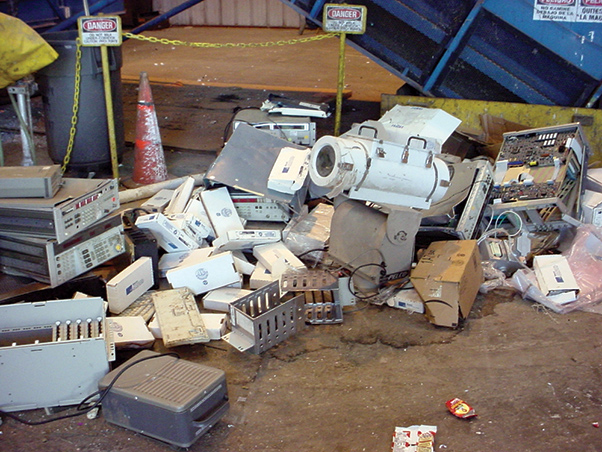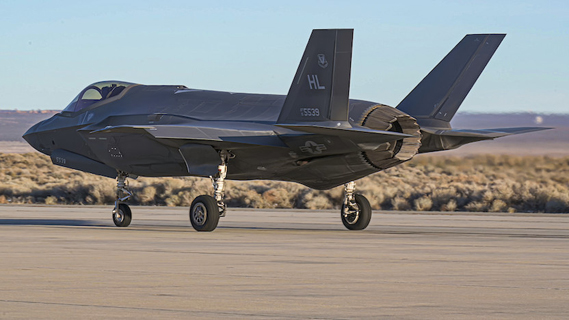People often think, “Out of sight, out of mind.” But that is not the case for waste and the environment. There are some things that should never be thrown in the trash.
It would seem like containers full of gasoline, and gunpowder would be a no brainer, but it’s pretty common to find gasoline and used motor oil in the trash; once, we actually did find a container of gunpowder that had been tossed into the trash. This is a big safety concern as well as a potential hazard to the environment. Because of the potential environmental impact, Edwards Air Force Base is required to send quarterly reports to the California Environmental Protection Agency.
One of the things we are required to report are the items which are pulled out of the trash by landfill personnel and sent either to our Hazardous Waste Storage Facility or Consolidated Recycling Universal Waste facility for proper disposition. Some of the prohibited items most commonly found in the trash are electronic waste, aerosol cans, paint, tires, used motor oil, and treated wood.
In fiscal year 2018, the following items were recovered from the Base’s Landfill: 109 TV/computer monitors, 67 tires, 72 fluorescent light bulbs, 49 gallons of waste oil, 2.5 tons of e-waste, 1903 aerosol cans, 40 microwave ovens, and 50 printers. So far in fiscal year 2019 for these same items: 114 TV/computer monitors, 83 tires, 14 fluorescent bulbs, 39 gallons of waste oil, 1.5 tons of e-waste, 1356 aerosol cans, 29 microwaves, and 39 printers.
As you can see, overall, things aren’t really getting better! Keep in mind that none of this came from privatized housing, as all their waste is hauled off to local regional landfills off base. None of these item are things that should be buried in the ground (our landfill) and potentially be coming into contact with our aquifers and drinking water. In fact, since they can mostly be recycled, they are generally classified as Universal Waste, but when not recycled, they are considered Hazardous Waste.
Edwards Air Force Base has provisions for conveniently disposing of all locally generated Universal and Hazardous Waste. For housing residents, this would be the Corvias Housing Office for all household chemicals, batteries, and E-waste. They may be contacted at 661-385-6060, operating hours are from 7 a.m. to 3:30 pm., Monday through Friday.
For engine fluids from personally-owned vehicles, contact the Auto Hobby Shop at 661-275-2886, open Tuesday and Wednesday 9 a.m. to 6 p.m., Thursday and Friday noon to 8 p.m., and Saturday 9 a.m. to 5 p.m.
For all other Base activities, the Base’s HWSF/CRUW should be contacted at 661-277-3681 during regular business hours.
The Air Force is counting on you to protect our safety and resources and prevent pollution, everyone needs to do their part to properly dispose of waste.
California Universal Waste
Below is a list of the universal waste items commonly generated here at Edwards AFB. For the complete California Universal Waste List go to the Department of Toxic Substances Control’s Web site at www.dtsc.ca.gov. For information on applicable regulations and Edwards AFB universal waste management procedures, call the HWSF at 661-277-3681.
1. All Aerosol Cans
2. Household Batteries
These types of batteries are found in a variety of items including cell phones, pagers, cameras, computers, flashlights, power tools, monitoring devices, lanterns, burglar alarms and emergency lighting systems.
* Alkaline (AAA, AA, C, D, 9V, etc)
* Magnesium Mercury
* Nickel Cadmium (NiCd)
* Small sealed lead-acid (UPS, scooter)
* Zinc-carbon
* Lithium ion (laptop, cell phone)
* Nickel Metal Hydride (NiMh) (power tools)
NOTE: When possible, use plastic bags to transport batteries to the collection center.
3. Electronic Devices (E-waste)
* Computer monitors
* Oscilloscopes
* Televisions
* Cellphones
* Computers
* Printers
* Radios
* Telephones
* VCRs
* DVDs
4. Lamps
* Fluorescent tubes
* Compact fluorescent bulbs
* High intensity discharge bulbs
* Metal halide bulbs
* Neon bulbs Sodium bulbs
NOTE: When possible, use original packaging to turn lamps in to the collection center.
5. Mercury-Containing Devices
* Old-style thermostats with a sealed glass “tilt switch” containing liquid mercury
* Other novelties or devices containing mercury
* Thermometers
6. Broken or Damaged Universal Waste Items
Most items listed above are managed as hazardous waste when damaged and/or broken. Bring broken or damaged universal waste to the HWSF/CRUW.
* Other Household Hazardous Wastes
* Cleaners (oven, drain, etc)
* Fertilizers
* Glue and adhesives Painting supplies Pesticides
* Poisons Resins Solvents
* Compressed gas cylinders












